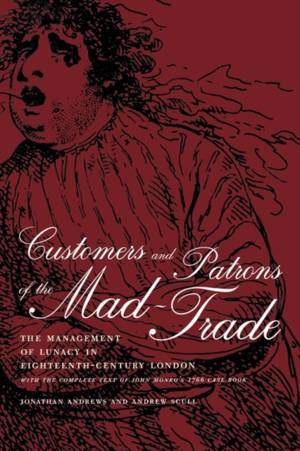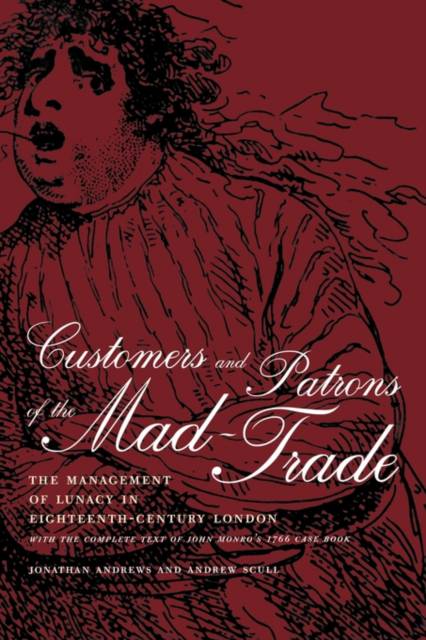
Bedankt voor het vertrouwen het afgelopen jaar! Om jou te bedanken bieden we GRATIS verzending (in België) aan op alles gedurende de hele maand januari.
- Afhalen na 1 uur in een winkel met voorraad
- In januari gratis thuislevering in België
- Ruim aanbod met 7 miljoen producten
Bedankt voor het vertrouwen het afgelopen jaar! Om jou te bedanken bieden we GRATIS verzending (in België) aan op alles gedurende de hele maand januari.
- Afhalen na 1 uur in een winkel met voorraad
- In januari gratis thuislevering in België
- Ruim aanbod met 7 miljoen producten
Zoeken
Customers and Patrons of the Mad-Trade
The Management of Lunacy in Eighteenth-Century London Volume 12
Jonathan Andrews, Andrew Scull
€ 106,95
+ 213 punten
Omschrijving
This book is a lively commentary on the eighteenth-century mad-business, its practitioners, its patients (or "customers"), and its patrons, viewed through the unique lens of the private case book kept by the most famous mad-doctor in Augustan England, Dr. John Monro (1715-1791). Monro's case book, comprising the doctor's jottings on patients he saw in the course of his private practice--patients drawn from a great variety of social strata--offers an extraordinary window into the subterranean world of the mad-trade in eighteenth-century London.
The volume concludes with a complete edition of the case book itself, transcribed in full with editorial annotations by the authors. In the fragmented stories Monro's case book provides, Andrews and Scull find a poignant underworld of human psychological distress, some of it strange and some quite familiar. They place these "cases" in a real world where John Monro and othersuccessful doctors were practicing, not to say inventing, the diagnosis and treatment of madness.
The volume concludes with a complete edition of the case book itself, transcribed in full with editorial annotations by the authors. In the fragmented stories Monro's case book provides, Andrews and Scull find a poignant underworld of human psychological distress, some of it strange and some quite familiar. They place these "cases" in a real world where John Monro and othersuccessful doctors were practicing, not to say inventing, the diagnosis and treatment of madness.
Specificaties
Betrokkenen
- Auteur(s):
- Uitgeverij:
Inhoud
- Aantal bladzijden:
- 352
- Taal:
- Engels
- Reeks:
- Reeksnummer:
- nr. 12
Eigenschappen
- Productcode (EAN):
- 9780520226609
- Verschijningsdatum:
- 16/01/2003
- Uitvoering:
- Hardcover
- Formaat:
- Genaaid
- Afmetingen:
- 157 mm x 241 mm
- Gewicht:
- 689 g

Alleen bij Standaard Boekhandel
+ 213 punten op je klantenkaart van Standaard Boekhandel
Beoordelingen
We publiceren alleen reviews die voldoen aan de voorwaarden voor reviews. Bekijk onze voorwaarden voor reviews.









